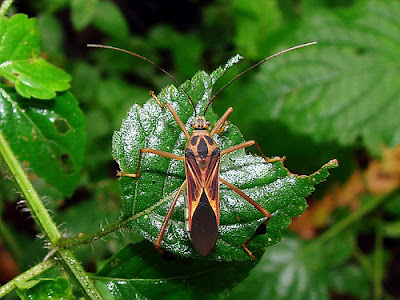One of the most important tributaries of the Amazon river has fallen to its lowest level in over a century, following a fierce drought that has isolated tens of thousands of rainforest inhabitants and raised concerns about the possible impact of climate change on the region.
Photo courtesy of Raimundo Valentim/EPA/CORBIS
Tuesday, October 26, 2010
Giant snakes, fish among spectacular species found in Amazon
Spectacular species previously unknown to the outside world are being discovered in the Amazon rainforest at a rate of one every three days, environment group WWF said in a report published Tuesday.
Photo courtesy of Irene Lee/Flickr
Photo courtesy of Irene Lee/Flickr
Saturday, June 12, 2010
Deforestation Worsens in Brazilian Amazon
About 103.5 square km of rainforests disappeared in March and April in Brazil's Amazon region, roughly the size of Paris, said a new report.
Photo courtesy of apoloniox70/Flickr
Photo courtesy of apoloniox70/Flickr
Tuesday, May 11, 2010
UN fears 'irreversible' damage to natural environment
The third "Global Biodiversity Outlook" found that deforestation, pollution or overexploitation were damaging the productive capacity of the most vulnerable environments, including the Amazon rainforest, lakes and coral reefs.
Photo courtesy of Jeffrey Yamaguchi/Flickr
Photo courtesy of Jeffrey Yamaguchi/Flickr
Saturday, May 8, 2010
Brazil launches major push for sustainable palm oil in the Amazon
The palm oil program marks a new focus for Brazil, which currently produces about 110,000 metric tons of crude palm oil per year, a fraction of the amount produced by market leaders Indonesia (16.9 million metric tons in 2008) and Malaysia (15.8 m tons), according to the FAO.
Photo courtesy of Dennis Clark/Flickr
Photo courtesy of Dennis Clark/Flickr
Wednesday, May 5, 2010
Sting voices opposition to Amazon dam in Brazil
"All of the reasons I fought against it 20 years ago are still there. It will destroy an entire river system and destroy the lives and culture of the people who live there and have lived there for thousands of years," said Sting, who was in Venezuela for a concert.
Photo courtesy of Jazmin Million/Flickr
Photo courtesy of Jazmin Million/Flickr
Amazon loses 76 km ² of forest in March
Amazon deforestation rose again, according to Imazon. In March, the forest lost 76 square kilometers (km ²) of vegetation, a 35% increase over the same month in 2009.
Please note: This article is in Portuguese.
Photo courtesy of Rodrigo Baleia/Greenpeace
Please note: This article is in Portuguese.
Photo courtesy of Rodrigo Baleia/Greenpeace
Labels :
Amazon Rainforest,
Brazil,
Deforestation,
Deter,
DSS,
Imazon,
INPE,
Mato Grosso,
Pará,
Portuguese,
Rondônia
Half the Amazon Could be Lost by 2050, Says Study
According to a report from Globo Amazônia, the study conducted by Gilvan Sampaio of National Institute of Special Research (INPE) found that the vegetation of the Amazon will be particularly impacted by rising global temperatures in the years to come, in addition to the continued threats posed by deforestation and fires.
Photo courtesy of Alberto Cesar/Greenpeace
Photo courtesy of Alberto Cesar/Greenpeace
Monday, May 3, 2010
Saving the rainforests will save Florida
In short, it's going to be very difficult to protect Florida's natural wonders and the health of our economy from climate change unless we protect the world's rainforests.
Map Card courtesy of Striderv/Flickr
Map Card courtesy of Striderv/Flickr
Sunday, May 2, 2010
20 Pink Dolphins Die of Poisoning in Peruvian Amazon
La Republica said on Saturday that the pink dolphins of the Amazon must have eaten fish poisoned – according to preliminary investigations – with phosphorus or pesticides thrown in the water by unknown persons in order to eliminate them.
Photo courtesy of Kevin Schafer/K.S. Photography
Photo courtesy of Kevin Schafer/K.S. Photography
Saturday, May 1, 2010
Belo Monte is Not a Done Deal
Belo Monte Dam is by no means an inevitability, despite what the Brazilian government and the companies promoting the dam would like you to believe. Legal actions, protests and occupations by indigenous groups, and a growing international campaign could derail the project.
Photo courtesy of Sofie Wistrand/Flickr
Photo courtesy of Sofie Wistrand/Flickr
Labels :
Amazon Rainforest,
Amazon Watch,
ANEEL,
Belo Monte Dam,
BNDES,
Brazil,
Chesf,
Indigenous People,
International Rivers,
José Ailton de Lima,
Kayapo Indians,
Norte Energia,
President Lula,
Xingu River
Wednesday, April 28, 2010
Amazon Expedition Aims to Collect 100,000 Bugs
To date, around 1 million insect species have been identified throughout the world. But, while that may be a mind-boggling number, biologists estimate that there remains at least 4 million more left undiscovered--many of which may lie deep in the heart of the world's largest rainforest.
Photo courtesy of Shirley Sekarajasingham/Flickr
Photo courtesy of Shirley Sekarajasingham/Flickr
Tuesday, April 27, 2010
Silva: Not building Amazon dam would be 'insane'
Brazil's president says it would be "insane" to scrap an enormous hydroelectric dam in the Amazon region because other ways of generating power would cause more pollution.
Photo courtesy of Eraldo Peres/AP
Photo courtesy of Eraldo Peres/AP
Another Dam, More Rainforest Gone!
I have seen the self reliance of Brazil as the energy model. I have seen them move to renewable resources. Many things they have done are truly remarkable. But this? And 70 more? The WORLD relies on the rain forests. How will money replace that?
Photo courtesy of Sofie Wistrand/Flickr
Photo courtesy of Sofie Wistrand/Flickr
Saturday, April 24, 2010
Amazon hydro plants among most polluting in the world
Amazon hydro plants are some of the most polluting on the planet. Decomposing vegetation in the reservoir releases methane, a greenhouse gas 25 times more potent than carbon dioxide. Belo Monte alone will be a big methane producer, but if an additional dam is built upstream – as many fear – the projects together will release as many greenhouse gases as three average-sized coal plants.
Photo courtesy of Alice Cassell/Flickr
Photo courtesy of Alice Cassell/Flickr
Subscribe to:
Comments (Atom)
















